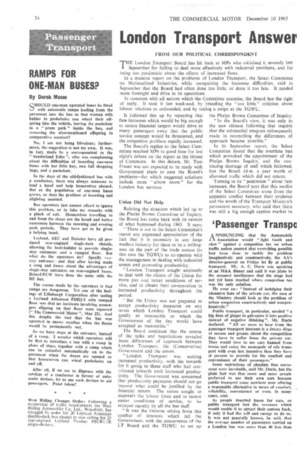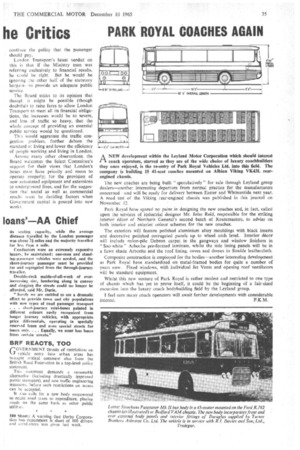London Transport Answer
Page 36

Page 37

If you've noticed an error in this article please click here to report it so we can fix it.
FROM OUR POLITICAL CORRESPONDENT
THE London Transport Board has hit back at MPs who criticized it severely last September for failing to deal more effectively with industrial problems, and for being too pessimistic about the effects of increased fares.
In a massive report on the problems of London Transport, the Select Committee on Nationalized Industries, while recognizing the immense difficulties, said in September that the Board had often done too little, or done it too late. It needed more foresight and drive in its operations.
In common with all sectors which the Committee examine, the Board has the right of reply. It took it last week-end, by branding the "too little" criticism about labour relations as unfounded, and by taking a swipe at the TGWU.
It followed this up by repeating that fare increases which would be big enough to secure financial targets would drive so many passengers away that the public service concept would be threatened, and the congestion problem rapidly increased.
The Board's replies to the Select Committee reached MPs in good time for last night's debate on the report in the House of Commons. In this debate, Mr. Tom Fraser was not expected to be ready with Government plans to ease the Board's problems—for which suggested solutions include more "elbow room" for the London bus services.
Union Did Not Help Relating the situation which led up to the Phelps Brown Committee of Inquiry, the Board has come back with its version of what happened during 1963. It says: "There is not in the Select Committee's report any expressed appreciation of the fact that it is necessary in any large modern industry for there to be a willingness on the part of the trade unions (in this case the TGWU) to co-operate with the management in dealing with industrial unrest and promoting productivity.
"London Transport sought anxiously to deal with the claims of the Union for more pay and better conditions of service, and to obtain their co-operation in increased productivity throughout the period.
"But the Union was not prepared to accept productivity measures on any terms which London Transport could justify as reasonable or which the Government of the day would have accepted as reasonable."
The Board continues that the course of the talks and negotiations revealed basic differences of approach between London Transport, the (Conservative) Government and the union.
"London Transport was seeking increased productivity, with the rewards for it going to those staff who had contributed towards such increased productivity. The Government was concerned that productivity payments should not go beyond what could be justified by the financial return. The union sought to maintain the labour force and to secure easier conditions of service, to be enjoyed equally by all the bus staff.
"It was the impasse arising from this conflict of interests which led the Government, with the concurrence of the LT Board and the TGWU, to set up
the Phelps Brown Committee of Inquiry.
"In the Board's view, it was only in the new climate following that inquiry that the substantial progress subsequently made in reconciling the differences of approach became possible."
In its September report, the Select Committee found that the overtime ban which provoked the appointment of the Phelps Brown Inquiry,' and the continuing shortage of staff which followed. lost the Board f..4 m. a year worth of alienated traffic which did not return.
Turning to its " pessimism " about fare increases, the Board says that this verdict of the Select Committee arose from the apparent conflict between their evidence and the words of the Transport Ministry's permanent secretary, who said that there was still a big enough captive market to continue the policy that the passenger should pay.
London Transport's latest verdict on this is that if the Ministry man was referring exclusively to financial results, he could be right. But he would be ignoring :he other half of the statutory bargain-to provide an adequate public service.
The Board sticks to its opinion that though it might be possible (though doubtful) to raise fares to allow London Transport to meet all its financial obligations, the increases would be so severe, and loss of traffic so heavy, that the whole concept of providing an essential public service would be questioned.
This would aggravate the traffic congestion problem, further debase the standard of living and lower the efficiency of people working and living. in London.
Among many other observations, the Board welcomes the Select Committee's support for their views that London's buses must have priority and room to operate properly; for the provision of new automated equipment and extensions to underground lines, and for the suggestion that social as well as commercial mulls must be deciding factors when Government capital is poured into new works.
he Critics




























































































































